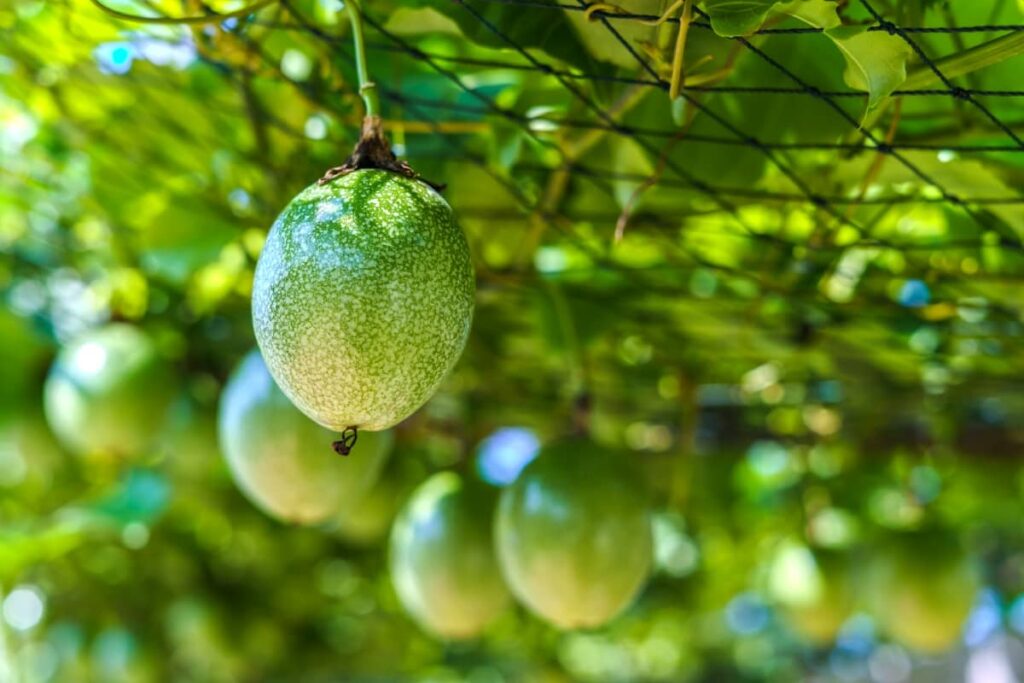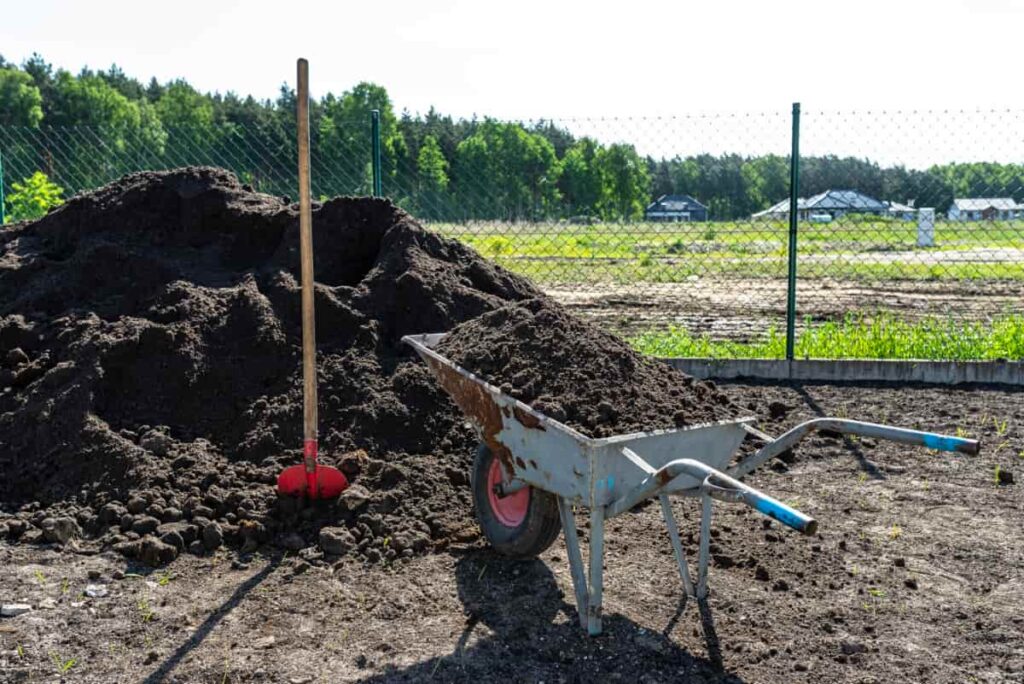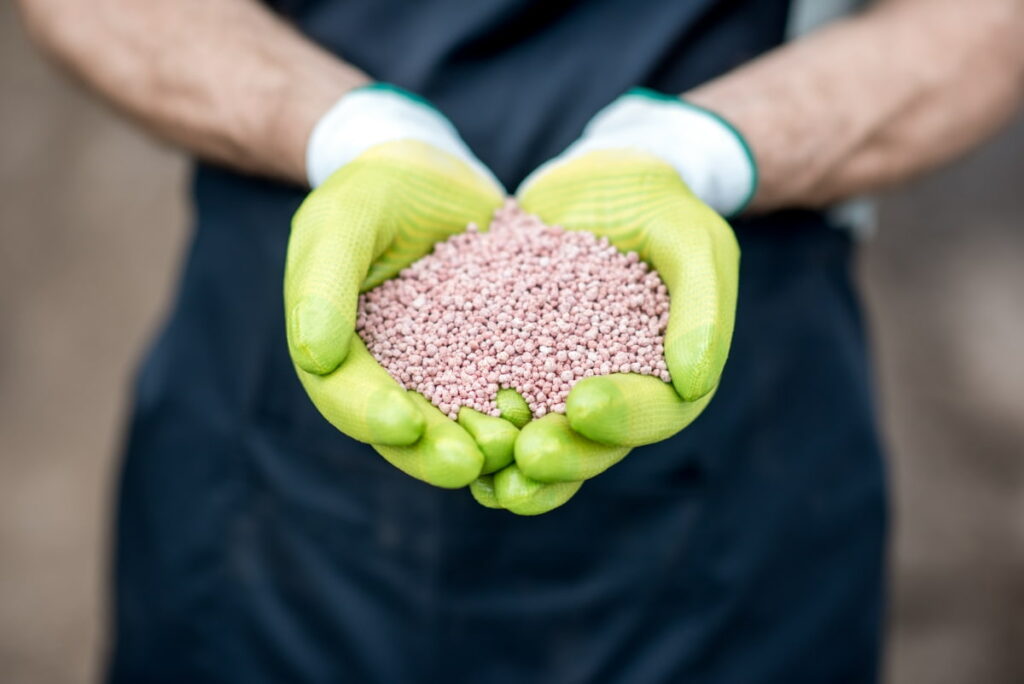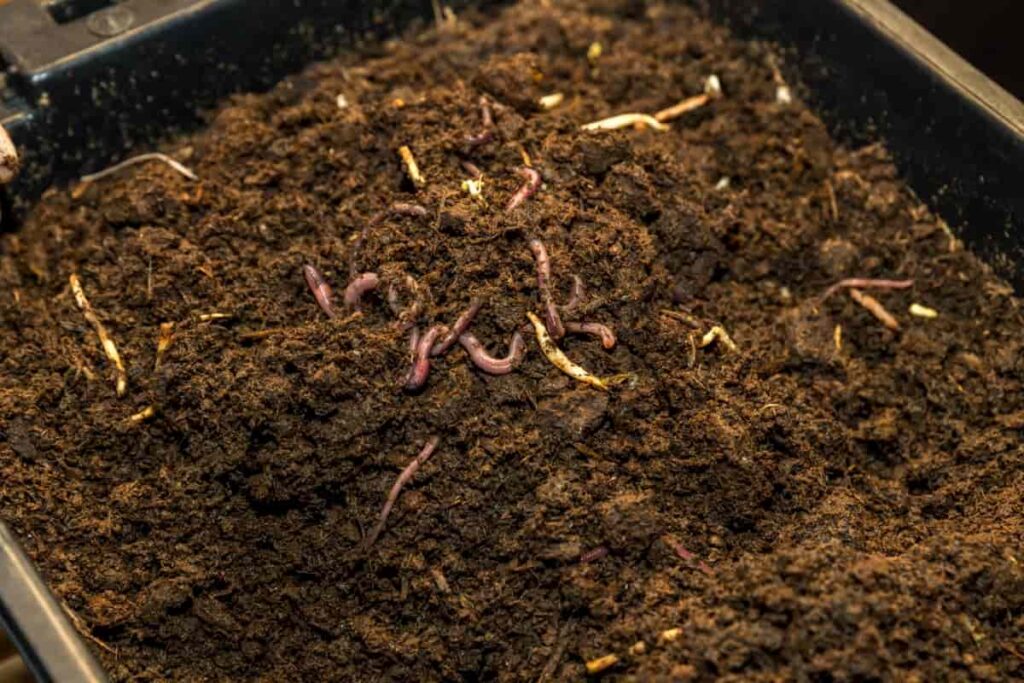Passion fruit, known for its vibrant flavor and exotic aroma, is a delightful addition to any garden or orchard. To ensure growth and abundant fruit production, proper fertilization is crucial. Organic and natural fertilizers are preferred by many gardeners for their sustainability and environmentally friendly qualities. These fertilizers not only nourish the plants but also contribute to soil health, promoting overall ecosystem balance. In this guide, we’ll explore the top 10 organic and natural Passion fruit fertilizer recommendations.

10 Best Passion Fruit Fertilizers
Organic Compost
Organic compost is an excellent passion fruit fertilizer, offering a balanced NPK ratio, typically around 2-1-2. To apply, spread a 2-inch layer around the base of the passion fruit plant, avoiding direct contact with the stem. Apply compost in early spring before the growing season and again in early fall for optimal results.
Twice a year is generally sufficient for passion fruit plants, ensuring they receive the necessary nutrients for healthy growth and fruit production. Compost enriches the soil, promotes microbial activity, and enhances water retention, fostering a thriving and sustainable passion fruit garden. Choose high-quality organic compost for the best results in nurturing your passion fruit plants naturally.
In case you missed it: Passion Fruit Cultivation Practices, Growing Methods

Well-Rotted Manure
Well-rotted manure, with an NPK ratio typically around 1-1-1, is an excellent organic fertilizer for Passion fruit vine feeding. Apply it in early spring before planting or as a top dressing around the plant’s base. Use about 2-4 inches of well-rotted manure, working it into the soil gently to avoid damaging roots.
Also, you can apply a smaller amount (about 1 inch) mid-season to provide a nutrient boost. Avoid direct contact with the plant’s stem to prevent rot. Since passion fruit plants are heavy feeders, repeat applications every 2-3 months during the growing season, but be cautious not to over-fertilize, which can lead to nutrient imbalances.
Npk Fertilizers
For Passion fruit plant nutrition, choose NPK fertilizers with balanced ratios suitable for passion fruit, such as 10-10-10 or 8-8-8. Apply fertilizer during the season, typically in spring and early summer. Evenly spread around the plant’s base, avoiding direct contact with the stems. Water thoroughly after application to facilitate nutrient absorption.
In case you missed it: Best Zucchini Fertilizer: What, When, and How to Apply

Administer fertilizer two to three times a year, spacing applications evenly throughout the growing season. Monitor plant health and adjust frequency based on soil quality and plant requirements. Avoid fertilizing during dormant periods to prevent nutrient runoff and potential harm to the plant.
Fish Emulsion Fertilizer
It is the best fertilizer for passion fruit plants. With a typical NPK ratio ranging from 2-4-0 to 5-1-1, it provides a balanced nutrient boost, promoting healthy growth and fruit development. Apply fish emulsion fertilizer every 4-6 weeks during the season, starting in early spring and continuing through late summer.
Dilute according to package instructions, typically around one tablespoon per gallon of water, and water the plants thoroughly after application. Avoid over-fertilizing, as it may lead to nutrient imbalances or burn. With its natural composition, fish emulsion enriches the soil with essential nutrients, enhancing the vigor and productivity of passion fruit plants while minimizing environmental impact.
Bone Meal
Bone meal is an excellent fertilizer for fertilizing Passion fruit vines, with an NPK ratio typically around 3-15-0. Apply bone meal by spreading it evenly around the base of the passion fruit plant, avoiding direct contact with the stems to prevent burning. It’s best to apply bone meal in early spring before the growing season begins to support healthy root development and again in late summer to promote fruiting.
Use about 1 to 2 cups of bone meal per plant per application. For optimal results, apply bone meal twice a year, ensuring a consistent nutrient supply for your passion fruit plants. Remember to water the area thoroughly after application to help nutrients penetrate the soil.
Blood Meal
A blood meal is a rich nitrogen source, ideal for Passion fruit garden care. With an NPK ratio typically around 12-0-0, it fosters lush foliage and vigorous growth. Apply blood meal sparingly, as it can burn plants if overused. For passion fruit, incorporate it into the soil during planting and apply it as a top dressing around the base of the plant.
Aim for a dosage of 1-2 tablespoons per plant, avoiding direct contact with the roots. Apply blood meal in early spring before the growing season begins and again in midsummer to replenish nutrients. Limit applications to twice a year to prevent nitrogen buildup and potential harm to the plant.
Worm Castings
Worm castings, a renowned top fertilizer for Passion fruit, boast an ideal NPK ratio typically ranging from 1-0-0 to 5-5-3. Apply worm castings by spreading a layer around the base of the passion fruit vine, ensuring it doesn’t touch the stem directly. For young plants, use around 1-2 inches of castings, gradually increasing to 3-4 inches as they mature.
In case you missed it: Top 10 Fertilizers for Treating Yellow Leaves in Indoor Plants

Apply in spring before flowering and again in late summer for optimal results. Since worm castings release nutrients slowly, one or two applications per year are generally sufficient. Regular monitoring of plant health and soil condition can help adjust the frequency if necessary, ensuring robust growth and fruit production.
Chicken Manure Pellets
Chicken manure pellets offer an excellent organic Passion fruit fertilizer option with an NPK ratio typically around 3-2-2, providing balanced nutrition. Apply pellets by spreading them evenly around the base of each plant, ensuring they’re incorporated into the soil to prevent runoff. Aim for application during the growing season, ideally in spring and early summer, to support vigorous growth and fruit development.
However, avoid excessive application to prevent nitrogen buildup. Typically, one to two applications per year should suffice, with adjustments based on soil quality and plant vigor. Always follow manufacturer instructions and consider soil testing for precise nutrient management.
Citrus Fertilizers
- Citrus Fertilizer (NPK ratio): Look for a fertilizer with an NPK ratio of around 2-1-1, reflecting the specific needs of passion fruit plants.
- How to apply: Sprinkle the fertilizer evenly around the drip line of the plant. Avoid direct contact with the trunk. Water thoroughly after application.
- When to apply: Feed your passion fruit plants in early spring as new growth begins and again in late spring or early summer.
- How many times to apply in a year: Apply fertilizer twice a year for optimal results—once in early spring and again in late spring or early summer. Adjust based on specific plant needs and local growing conditions.
Liquid Seaweed Fertilizers
Liquid seaweed fertilizers are rich in micronutrients, growth hormones, and trace elements for Passion fruit soil enrichment. Typically, they have an NPK ratio of around 0.1-0.1-1.0, promoting healthy growth without encouraging excessive foliage. To apply, dilute according to package instructions and spray directly onto the foliage and soil around the plant’s base. Apply every 2-4 weeks during the season, typically from spring to early fall, to support continuous growth and fruit production. Avoid applying during extreme heat or direct sunlight to prevent foliar burn.
Conclusion
When selecting a fertilizer for your passion fruit plants, consider factors such as nutrient content, application method, and environmental impact. By incorporating these organic and natural fertilizers into your gardening routine, you can ensure the optimal health and productivity of passion fruit vines while minimizing harm to the ecosystem.
- Management Pests and Diseases in Your Cotton Field
- Sheep Farming Business Plan for Beginners
- Aquaponic Farming at Home: A Step-By-Step Guide
- Profitable Village Farming Business Ideas in 2024
- High-Yield Aquaculture: Fast-Growing Fish for Farming
- Effective Fish Pond Construction Techniques for Beginners
- Irrigation and Water Management in Pineapple Farming
- Blossom to Harvest: Mastering Flowering and Pollination in Papaya Farming
- Pig Fattening Essentials: From Selection to Sale for Beginners
